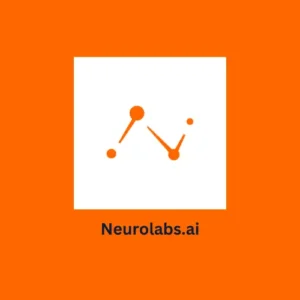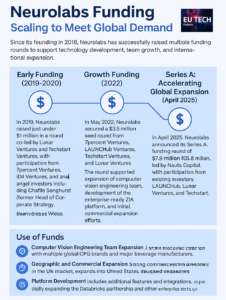London-based deeptech company Neurolabs is revolutionising how Consumer Packaged Goods (CPG) brands manage retail operations, using synthetic data and artificial intelligence to turn simple smartphone photos into instant, actionable insights that are transforming the $800 billion global CPG supply chain.
Neurolabs Key Takeaways
- Exceptional Growth Validated by Sifted: Neurolabs was named the fastest-growing deeptech startup in the UK and Ireland in 2025 with a 303% two-year revenue CAGR, demonstrating both the commercial viability of its synthetic data approach and strong market demand for AI-powered retail execution solutions.
- Series A Fuels Global Expansion: The company raised $7.8 million in April 2025 led by Nauta Capital, bringing total funding to over $12 million and supporting expansion of its computer vision engineering team and commercial footprint across the UK, Europe, and United States to tackle the $800 billion problem in CPG supply chain inefficiencies.
- Proven Enterprise Value: CPG brands using Neurolabs report 32% reduction in field operational costs, 93% faster product onboarding time, and reduction in time from store visit to action from days to minutes, demonstrating measurable return on investment that drives adoption among major global beverage and food manufacturers.
- Synthetic Data Innovation: By building 3D digital twins of products and generating millions of synthetic training images, Neurolabs has solved the fundamental scaling problem that limited traditional computer vision in retail, enabling rapid deployment of image recognition for new products in hours rather than weeks and achieving beyond-human level accuracy.
What is Neurolabs?
Neurolabs is a cutting-edge deeptech company specialising in image recognition software for the retail and Consumer Packaged Goods (CPG) industries. Founded in 2018 and headquartered in London, the company has developed what it describes as enterprise-level Image Recognition as a Service (IRaaS), providing CPG brands with a comprehensive platform to automate and optimise in-store retail execution.

The company’s name, derived from “neural” networks and “laboratories,” reflects its origins in the academic research labs of the University of Edinburgh, where the founders first explored the potential of combining computer vision with synthetic data generation. What began as an academic exploration has evolved into a commercial platform now trusted by some of the world’s largest beverage manufacturers and retail technology companies.
At its core, Neurolabs addresses a fundamental challenge facing CPG brands: the difficulty of maintaining visibility and control over how products are displayed, priced, and promoted across thousands of retail locations. Traditional approaches to retail execution rely on field teams manually auditing shelves, photographing products, and filing reports, a process that is time-consuming, expensive, and slow to generate actionable insights. By the time data from a store visit is processed and analysed, market conditions may have already changed.
Neurolabs transforms this process by using computer vision powered by synthetic data. Field representatives simply photograph shelves with a smartphone, and within seconds, the platform’s AI analyses the images to identify products, verify placement against planograms, check pricing and promotions, assess competitor activity, and detect out-of-stock situations. This instant feedback loop allows brands to respond to issues in minutes rather than days.
Recently named the fastest-growing deeptech startup in the UK and Ireland by Sifted with a remarkable 303% two-year revenue CAGR, Neurolabs is demonstrating that synthetic data and visual AI are not just theoretical concepts but practical tools delivering measurable business value at enterprise scale.
The Neurolabs Founders: Three Romanian Scientists Who Saw Beyond Traditional Computer Vision
Neurolabs was founded by three Romanian computer scientists who met whilst studying at the University of Edinburgh and combined deep academic expertise with practical industry experience.
Paul Pop: CEO and Commercial Leader
Paul Pop serves as Co-Founder and CEO. His background includes studies in AI and experience at Schlumberger and, notably, as a Senior Data Science Lead at Hudl, a sports technology company. It was at Hudl that he first encountered synthetic data as a scalable solution to the challenge of insufficient real-world training data for computer vision.

Pop decided to quit his job in London to pursue this vision alongside his long-time collaborators. As CEO, he combines technical understanding with commercial acumen, having completed several certifications in leadership and executive presence to complement his technical skills. He is passionate about applying machine learning to real-world business problems and has been vocal about Neurolabs’ mission to solve inefficiencies in CPG supply chains.
Patric Fulop: CTO and Technical Architect
Patric Fulop serves as Co-Founder and CTO. He holds a PhD in Machine Learning from the University of Edinburgh. His deep academic grounding in computer vision and pattern recognition has been crucial in building the company’s rigorous synthetic data generation pipeline.

Before co-founding Neurolabs, Fulop held positions that gave him insight into both the financial services and energy sectors. He worked as a technology analyst at J.P. Morgan, gaining exposure to how large enterprises evaluate and implement technology solutions. He also worked at Schlumberger as a software engineer, though his tenure there did not overlap with Pop’s.
Remus Pop: CRO and Operations Expert
Remus Pop serves as Co-Founder and Chief Revenue Officer (initially COO). With a background in financial risk management at institutions like Bank of America Merrill Lynch, he brings quantitative analysis and operational efficiency skills to scaling Neurolabs’ commercial operations.

Before Neurolabs, Remus spent most of his career in the financial services industry, most recently as a Foreign Exchange Market Risk Analyst at Bank of America Merrill Lynch. This experience in financial risk management and quantitative analysis provided skills in data-driven decision-making and operational efficiency that have proven valuable in scaling Neurolabs’ commercial operations.
How Neurolabs Works: The Synthetic Data Revolution
What makes Neurolabs distinctive is its fundamental approach to solving the computer vision problem in retail. Whilst traditional image recognition requires collecting thousands of real-world photos and manually labelling them, Neurolabs generates training data synthetically, dramatically reducing time, cost, and complexity.
The Synthetic Data Approach
Traditional computer vision follows a well-established but labour-intensive process. To train an AI model to recognise a specific product, you would need to photograph that product in hundreds or thousands of different conditions: various lighting situations, different angles and orientations, partial occlusions by other products, different backgrounds, and worn or damaged packaging. Each photograph then requires manual annotation, with human labellers drawing boxes around products and labelling them. This process is expensive, time-consuming, and doesn’t scale well when products change frequently.
Neurolabs inverts this process. Instead of starting with real photos, the company creates detailed 3D digital twins of products. These digital replicas capture every detail of a product’s appearance: shape, size, colours, textures, and labelling. Once a digital twin exists, it can be placed in virtual retail environments, photographed from any angle, under any lighting condition, with any combination of surrounding products.
This synthetic data generation allows Neurolabs to create thousands or millions of training images from a single 3D model in a fraction of the time it would take to photograph and label real products. When a CPG brand introduces a new product or changes packaging, Neurolabs can update the digital twin and retrain its models in hours rather than weeks.
The synthetic approach also allows Neurolabs to train models on scenarios that would be difficult or expensive to capture in real life. Want to see how the AI performs when products are partially hidden behind promotional displays? Generate synthetic images with that scenario. Concerned about model performance in poorly lit stores? Generate synthetic images with various lighting conditions. Need to handle damaged packaging or products placed upside down? Synthetic data makes it trivial to include these edge cases in training.
The ZIA Platform: Enterprise-Level Image Recognition
The commercial embodiment of Neurolabs’ technology is the ZIA platform, an enterprise-ready system for automated retail execution. ZIA provides several core capabilities.
- Product Cataloguing is the platform’s foundation. Neurolabs maintains an extensive library of 3D digital twins covering a growing portion of the retail shelf. When a brand becomes a customer, Neurolabs either provides existing digital twins for their products or creates new ones. The platform aims to achieve full coverage of over one million CPG products globally.
- Mobile Image Capture makes the system accessible. Field representatives use a standard smartphone to photograph shelves. The images are uploaded to ZIA either immediately (if internet connectivity is available) or in batches later.
- Instant Analysis provides immediate feedback. Within seconds of upload, ZIA’s computer vision models analyse the image to identify every product visible, determine product quantities and facings (how many units are visible from the front), verify planogram compliance (whether products are placed according to brand guidelines), check pricing accuracy, assess promotional display execution, and identify competitor products and their placement.
- Actionable Insights drive immediate improvements. The platform doesn’t just report what it sees but provides specific recommendations. Out of stock on a key SKU? The field representative receives an immediate alert to discuss restocking with store management. Competitor gaining excessive shelf space? The data is flagged for strategic review. Promotional display not executed correctly? The issue is documented with photographic evidence for follow-up.
- Integration with Enterprise Systems ensures seamless workflow. ZIA integrates with Sales Force Automation platforms like Aforza Studio, Customer Relationship Management systems, Enterprise Resource Planning software, and Business Intelligence tools. This allows retail execution data to flow into existing business processes without requiring teams to adopt entirely new workflows.
Recent Platform Enhancement: Databricks Integration
In a significant move for enterprise customers, Neurolabs recently integrated its platform with Databricks. This collaboration establishes Neurolabs’ Visual AI as a native layer within the Databricks Data Intelligence Platform.
This integration allows CPG brands to transform fragmented shelf images into governed, SKU-level data within Unity Catalog. Brands can now blend visual data with other enterprise datasets (sales, inventory) to gain a secure, complete view of retail execution inside a single governed environment.
Neurolabs Funding: Scaling to Meet Global Demand
Since its founding in 2018, Neurolabs has successfully raised multiple funding rounds to support technology development, team growth, and international expansion. The company’s funding journey reflects both the maturation of its technology and growing market validation from enterprise customers.
Early Funding (2019-2020)
Neurolabs’ first external funding came in 2019, when the company raised just under $1 million in a round co-led by Lunar Ventures and Techstart Ventures, with participation from 7percent Ventures, ID4 Ventures, and angel investors including Charlie Songhurst (former Head of Corporate Strategy at Microsoft) and Andreas Wiese. This seed capital funded the company’s initial research and development process and engineering effort to build the Neurolabs platform.
At this stage, the company was still refining its core technology and proving that synthetic data could deliver accurate image recognition in real-world retail environments. The funding allowed the founders to expand from three to approximately 10 employees, split between Edinburgh and Cluj-Napoca.
Growth Funding (2022)
In May 2022, Neurolabs secured a $3.5 million seed round from 7percent Ventures, LAUNCHub Ventures, Techstart Ventures, and Lunar Ventures. By this point, the company had validated its technology with initial customers and was ready to scale both the platform and the team. The funding supported expansion of the computer vision engineering team, development of the enterprise-ready ZIA platform, and initial commercial expansion efforts.
This round reflected growing investor confidence that synthetic data represented a genuine breakthrough for computer vision applications in dynamic environments where traditional approaches struggled.
Series A: Accelerating Global Expansion (April 2025)
In April 2025, Neurolabs announced its Series A funding round of $7.8 million (£5.8 million, €7.2 million), led by Nauta Capital with participation from existing investors LAUNCHub, Lunar Ventures, and Techstart. This represents the company’s third major funding round and brings total investment to over $12 million.
The Series A funding coincided with Neurolabs being named the fastest-growing deeptech startup in the UK and Ireland by Sifted, having achieved a remarkable 303% two-year revenue CAGR. This growth rate placed Neurolabs not only as the top deeptech company but as the 16th fastest-growing startup overall across the UK and Ireland, a significant validation of both the technology and the business model.
The funding round reflected several key factors. Strong commercial traction with multiple global CPG brands and major beverage manufacturers using the platform daily demonstrated proven technology performance, with customers reporting 32% reduction in field operational costs and 93% faster product onboarding time. The strategic importance of the market, addressing an $800 billion problem in global CPG supply chain inefficiencies, created significant investor interest. The quality of the founding team, combining deep technical expertise with industry experience, and the strength of existing investors doubling down on their commitments all contributed to the successful raise.
Carles Ferrer, General Partner at Nauta, explained the investment rationale: “The rise of AI-powered products in recent years has been astronomical, but the adoption of truly innovative AI remains a significant challenge, especially at the enterprise level. Neurolabs’ use of synthetic data pipelines is enabling some of the world’s largest CPG brands to rapidly embed Visual AI at the core of their retail operations. This commercial traction, combined with the strength of the technology and the team, has really impressed everyone at Nauta. We’re excited to back Neurolabs at this pivotal stage.”

Use of Funds
The Series A capital is being deployed across three primary areas:
- Computer Vision Engineering Team Expansion is a top priority. Neurolabs is growing its engineering team to accelerate development of its synthetic data generation capabilities, improve model accuracy and performance, expand product catalogue coverage toward the goal of one million products, and reduce onboarding time for new customers and products.
- Geographic and Commercial Expansion focuses on strengthening presence in the UK market where Neurolabs has established early traction, deepening penetration in European markets across beverages, food, and personal care categories, and expanding into the United States, the world’s largest CPG market.
- Platform Development includes building additional features and integrations, particularly expanding the Databricks partnership and other enterprise data platform integrations, developing more sophisticated analytics and reporting capabilities, and enhancing the mobile application experience for field teams.
Target Market and Customer Success Stories
Neurolabs targets enterprise-scale CPG brands and major retailers with complex, geographically dispersed operations.
Proven Customer Results
Customers, including a US soft drinks manufacturer and European beverage companies, are achieving measurable results:
- 32% reduction in field operational costs.
- 93% reduction in product onboarding time (due to synthetic data).
- Time from store visit to action reduced from days to minutes.
- Improved planogram compliance and enhanced promotional effectiveness.
Industry Recognition and Awards
- Sifted’s Fastest-Growing Deeptech Startup (2025): Ranked #1 in the UK and Ireland deeptech sector.
- Promotion Optimization Institute (POI) Recognition: Featured in the POI Vendor Panorama for redefining Enterprise Planning.
Market Opportunity: The $800 Billion Problem
Paul Pop frequently describes Neurolabs as addressing “the $800 billion problem of inefficiencies in CPG supply chains.” This figure reflects the cumulative impact of several interrelated challenges:
- Out-of-stock situations cost CPG brands an estimated $200 billion annually in lost sales globally. When products aren’t available on shelves, consumers either purchase competitor products or don’t make the purchase at all.
- Planogram non-compliance results in reduced sales and margin erosion. Products placed in suboptimal shelf locations sell less than when positioned according to tested planograms. Promotional displays that aren’t executed correctly fail to deliver expected sales lifts.
- Manual audit costs consume substantial resources. Field teams visiting stores, photographing shelves, and filing reports represent a significant ongoing expense for CPG brands.
- Slow decision cycles mean opportunities are missed. By the time traditional audits are completed, analysed, and acted upon, market conditions have changed. Promotions end, competitor actions have taken effect, and stock-outs have lasted days or weeks.
- Limited visibility prevents strategic improvement. When brands can only afford to audit a sample of stores, they lack the comprehensive data needed to identify systemic issues, regional variations, or best practices that could be scaled.
Neurolabs addresses all these challenges simultaneously. By making audits instant and affordable, the platform enables comprehensive rather than sample-based monitoring. By providing real-time feedback, it allows immediate response to issues. By eliminating manual processes, it reduces costs whilst improving data quality. By building digital twins, it accelerates onboarding of new products and enables proactive rather than reactive execution.
The addressable market extends beyond the CPG brands themselves. Retailers increasingly want better shelf execution data to optimise their own inventory and merchandising. Field marketing agencies that conduct store audits on behalf of multiple brands need tools to improve efficiency and deliverable quality. Sales force automation platforms seek computer vision capabilities to enhance their offerings.
With UK public sector spending of £400 billion and global government procurement exceeding $13 trillion annually, and annual CPG global spending of several trillion dollars, Neurolabs is targeting a massive market where even small efficiency improvements translate to billions in value.
The Road Ahead: Strategic Priorities
As Neurolabs enters its next phase of growth following the Series A funding, several strategic priorities will shape its trajectory:
Geographic Expansion
Whilst the UK and Europe have been Neurolabs’ initial focus, expansion into the United States represents a massive opportunity. The US CPG market is the world’s largest, with enormous brands managing complex, geographically dispersed retail execution. Success in the US will require adapting to different retail formats (from convenience stores to big-box retailers), building relationships with US-based CPG companies, and potentially establishing a US office to support customers in American time zones.
Product Catalogue Expansion
The goal of covering over one million CPG products globally is ambitious but achievable with the Series A funding. Priorities include expanding coverage in beverages, the initial focus category where Neurolabs has strong traction, building out food categories including snacks, dairy, frozen, and shelf-stable products, and adding personal care and household products to address CPG conglomerates with diverse portfolios.
Each product added to the catalogue increases the platform’s value for both new and existing customers, creating a virtuous cycle of growth.
Platform Capabilities Enhancement
Beyond geographic and product expansion, Neurolabs will continue enhancing the ZIA platform with new capabilities such as advanced analytics and predictive insights, expanded integration ecosystem beyond Databricks to include more data platforms and business tools, mobile app improvements for better user experience in stores, and vertical market features tailored to specific CPG categories with unique requirements.
Synthetic Data Leadership
As synthetic data becomes more widely recognised as a transformative approach for AI training across industries, Neurolabs has an opportunity to establish thought leadership and potentially license its synthetic data generation technology beyond just the retail use case. The company’s proprietary datasets and 3D modelling capabilities could have applications in manufacturing, logistics, healthcare, and other domains where traditional data collection is expensive or impractical.
Conclusion: Visual AI and the Future of Retail Execution
Neurolabs is executing on an ambitious vision to be the global standard in image recognition for the CPG space. With strong backing, proven execution, and a powerful, scalable synthetic data engine, the company is poised to become an essential layer of the modern retail tech stack. By making retail execution transparent, efficient, and data-driven, Neurolabs is delivering significant value to its customers while solving the massive inefficiencies plaguing the global supply chain.

